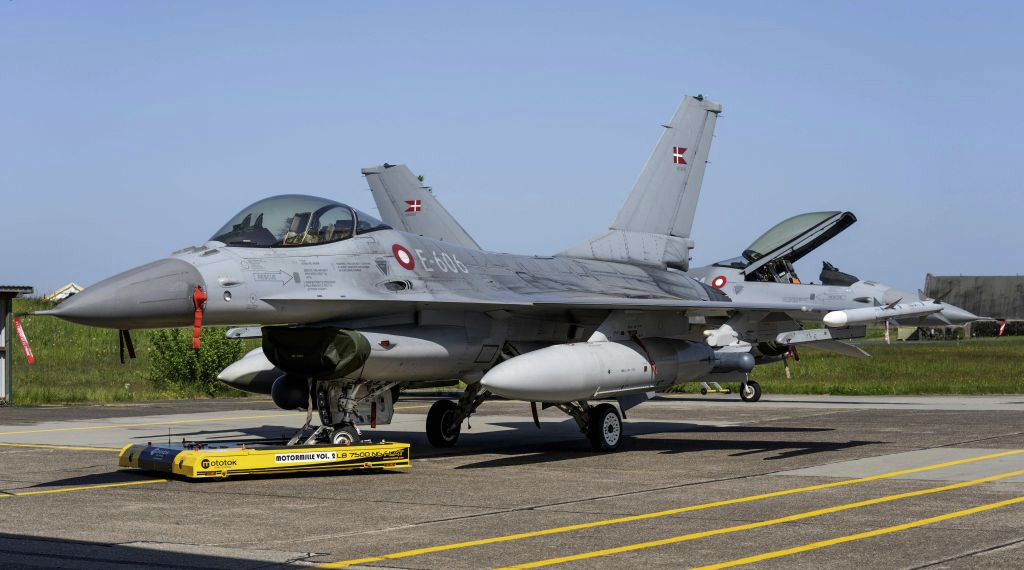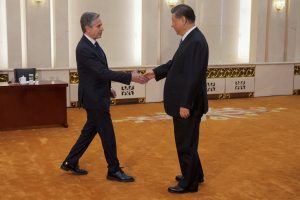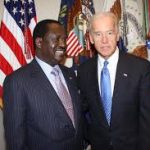Is Biden Encouraging America’s Enemies?

One way for the Biden administration to respond to the turmoil in Russia would be to increase its military support for Ukraine, thereby enabling the Ukrainian forces to inflict a catastrophic defeat against the Russian occupiers, an outcome that would severely diminish Moscow’s ability to threaten the US and its allies for decades to come.
Speeding up the process of allowing Kyiv to take delivery of US-built F-16 fighter jets would be a good place to start, rather than sticking to the current timetable whereby it could take several months before the first jets arrive in Ukraine. Under the present delivery schedule, the first F-16s are not due to arrive in Ukraine until at least September, by which time the current Ukrainian counter-offensive will be drawing to a close.
Yet, such is the risk averse nature of the Biden administration in dealing with tyrannical regimes such as Putin’s Russia, that the White House’s primary concern as the mutiny unfolded was to reassure the Kremlin that it had played no role in provoking the uprising.
Such is the White House’s obsession with avoiding direct American involvement in any kind of global conflict prior to next year’s presidential election, that Biden’s default position when faced with any major crisis, whether it concerns Chinese aggression towards Taiwan or Russian war crimes in Ukraine, is to play down the possibility of Washington undertaking any meaningful response.
Biden’s willingness to abdicate his global responsibilities in world affairs, as well as his failure to defend and protect America’s vital interests, has not been lost on Washington’s enemies, as was evident from US Secretary of State Antony Blinken’s recent hapless visit to China.
China’s ruling communists know weakness when they see it, and their refusal to respond positively to most proposals put forward by Blinken, even one such as re-establishing communication links between the US and Chinese militaries, demonstrated that Beijing was in no mood to tone down its aggressive stance on Taiwan’s independence.
With most Western intelligence agencies predicting that China will seek to reclaim Taiwan by force by 2027 at the latest, the Biden administration’s confused position on Taiwan, with Blinken even declaring that Washington does not support Taiwan’s independence, will only encourage Beijing’s communist rulers in the belief that they will encounter no meaningful resistance from the US if they launch their long-planned invasion of the island.
Such behaviour on the part of the Biden administration is entirely consistent with its policy of avoiding confrontation at all costs, even if it means providing reassurance to despotic leaders such as Putin, Chinese President Xi Jinping, North Korea’s Kim Jung-Un and Iran’s hegemonic mullahs, often in their hour of need.
The longer the Biden administration persists with its policy of strategic equivocation, the more tyrannical regimes in Russia, China, Iran and North Korea will be encouraged to believe they can pursue their diabolical schemes to increase their power and influence across the globe – not only with total impunity, but sometimes even with help.
One way for the Biden administration to respond to the turmoil in Russia would be to increase its military support for Ukraine. Speeding up the process of allowing Kyiv to take delivery of US-built F-16 fighter jets would be a good place to start. Pictured: A Danish F-16 fighter jet at the Fighter Wing Skrydstrup Air Base near Vojens, Denmark. One of the countries considering donating F-16s to Ukraine is Denmark. (Photo by Bo Amstrup/Ritzau Scanpix/AFP via Getty Images)
In normal circumstances, US policymakers would see the humiliation Russian President Vladimir Putin has suffered following the aborted mutiny against his administration as an opportunity to exploit the Kremlin’s weakness.
Russia, after all, still possesses the world’s largest stockpile of nuclear weapons, and Putin has on several occasions made specific reference to the possibility that Moscow might resort to using them when warning about the dangers of American interference in the Ukraine conflict.
In such circumstances, therefore, it is clearly in Washington’s interest to take advantage of the political turmoil engulfing the Kremlin in the wake of the aborted mutiny by Yevgeny Prigozhin, the head of Russia’s Wagner Group.
The 62-year-old Prigozhin was previously regarded as being a close ally of the Russian president, and it was Putin who personally authorised the establishment of Wagner back in 2014 so that he could have his own private army at his disposal to pursue his territorial ambitions in Europe and beyond.
Prigozhin’s increasingly bitter criticism of the Kremlin’s handling of the war in Ukraine, which resulted in his decision to launch his short-lived rebellion, has dealt a bitter blow to Putin, at a stroke exposing the myth of his image as Russia’s strongman.
While the future of Russia hung in the balance, Putin was nowhere to be seen, with rumour abounding that he had fled the capital in his private jet. While Kremlin officials later insisted Putin had remained in Moscow throughout the crisis, the weakness of Putin’s position was exposed after it was left to Belarusian president Alexander Lukashenko to broker a deal, which resulted in Prigozhin agreeing to stand down his forces in return for being granted a safe haven in Belarus.
While Putin has subsequently sought to reassure the Russian people that he remains in control, addressing the nation flanked by his key military and security officials, there is little doubt that the Russian leader has been severely damaged by recent events, a state of affairs that provides the US with a golden opportunity to exploit Russia’s weakness.
One way for the Biden administration to respond to the turmoil in Russia would be to increase its military support for Ukraine, thereby enabling the Ukrainian forces to inflict a catastrophic defeat against the Russian occupiers, an outcome that would severely diminish Moscow’s ability to threaten the US and its allies for decades to come.
Speeding up the process of allowing Kyiv to take delivery of US-built F-16 fighter jets would be a good place to start, rather than sticking to the current timetable whereby it could take several months before the first jets arrive in Ukraine. Under the present delivery schedule, the first F-16s are not due to arrive in Ukraine until at least September, by which time the current Ukrainian counter-offensive will be drawing to a close.
Yet, such is the risk averse nature of the Biden administration in dealing with tyrannical regimes such as Putin’s Russia, that the White House’s primary concern as the mutiny unfolded was to reassure the Kremlin that it had played no role in provoking the uprising.
As Biden remarked in his first comments on the mutiny, his overriding concern was to gather key allies on a video call “to make sure we gave Putin no excuse” to “blame this on the West or to blame this on Nato.”
There was a time when an American administration that was committed to providing effective leadership on the world stage might have preferred to have left the Kremlin guessing about the exact nature of the threat it faced, thereby adding to the confusion, rather than seeking to allay its fears of American involvement.
Such behaviour on the part of the Biden administration is entirely consistent with its policy of avoiding confrontation at all costs, even if it means providing reassurance to despotic leaders such as Putin, Chinese President Xi Jinping, North Korea’s Kim Jung-Un and Iran’s hegemonic mullahs, often in their hour of need.
Such is the White House’s obsession with avoiding direct American involvement in any kind of global conflict prior to next year’s presidential election, that Biden’s default position when faced with any major crisis, whether it concerns Chinese aggression towards Taiwan or Russian war crimes in Ukraine, is to play down the possibility of Washington undertaking any meaningful response.
Biden’s willingness to abdicate his global responsibilities in world affairs, as well as his failure to defend and protect America’s vital interests, has not been lost on Washington’s enemies, as was evident from US Secretary of State Antony Blinken’s recent hapless visit to China.
China’s ruling communists know weakness when they see it, and their refusal to respond positively to most proposals put forward by Blinken, even one such as re-establishing communication links between the US and Chinese militaries, demonstrated that Beijing was in no mood to tone down its aggressive stance on Taiwan’s independence.
With most Western intelligence agencies predicting that China will seek to reclaim Taiwan by force by 2027 at the latest, the Biden administration’s confused position on Taiwan, with Blinken even declaring that Washington does not support Taiwan’s independence, will only encourage Beijing’s communist rulers in the belief that they will encounter no meaningful resistance from the US if they launch their long-planned invasion of the island.
Indeed, following the disclosure that China is seeking to expand its military ties with Cuba, with plans to stand up a military training facility within 100 miles of Florida, it is clear Beijing believes it has nothing to fear from the US so long as Biden remains in power.
The longer the Biden administration persists with its policy of strategic equivocation, the more tyrannical regimes in Russia, China, Iran and North Korea will be encouraged to believe they can pursue their diabolical schemes to increase their power and influence across the globe – not only with total impunity, but sometimes even with help (here, here and here).

























